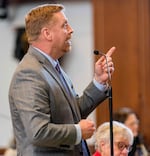
With use of so-called "placeholder" bills booming in the Oregon Capitol, lawmakers are pulling some surprising policies out of seemingly mundane proposals.
Illustration by Colleen Coover / Special to OPB
Oregon lawmakers met April 1 to consider a phantom.
The bill on tap for the Senate Judiciary Committee that Tuesday could hardly have been more simple. In a scant eight lines, Senate Bill 469 ordered the state’s parole board to “study parole law in the state” and report back in 2026.
But the committee wasn’t meeting to consider that version of SB 469.
As testimony from a small group of interested parties began, it became clear that a far more consequential policy was being proposed — one that would overhaul the state’s process for paroling convicted murderers.
Anyone looking for that version of the bill would have been out of luck. It was still being written by legislative attorneys and wouldn’t emerge until a day after SB 469’s only public hearing. Caught off guard, opponents of the idea scrambled to mount an opposition.
It’s not a unique occurrence in Salem this year.
The next day, April 2, a House committee took up what appeared to be another benign “study” bill, only to reveal that they were actually considering changes to how state liquor stores are regulated. Once again, the public was offered no notice of this switcheroo, and granted no glimpse of the actual bill until after the hearing — their sole chance to testify in person — was over.
No one in the Capitol believes this is how things should work. Some recoil at such antics. But they’ve become increasingly likely in recent years, as Oregon lawmakers have relied more on so-called “placeholder” bills to move their ideas.
Loved, tolerated or reviled, placeholders have exploded in Salem. A recent analysis by legislative lawyers estimated fewer than 40 were introduced in 2015. This year, lawmakers sent more than 615 into the legislative ether, an increase of more than 1500%.
With that deluge comes questions about transparency in a statehouse that is supposed to prioritize public involvement.
In extreme instances like those above, everyday Oregonians have been all but cut out as lawmakers hurriedly swap out bills’ contents — what’s known in Capitol parlance as a “gut and stuff.”
More often, lawmakers do offer at least some notice that a bill will be changed. That could be several days or weeks. Or it could be an hour.
“They do it to keep us off balance, to keep us in the dark,” said Derek LeBlanc, a Eugene firearms instructor who’s advocated on gun issues in Salem for years and has grown disenchanted with much of what he sees. “That’s where it’s affecting our Oregon politics.”
Critics say the practice lends itself to sloppy lawmaking where late amendments aren’t given enough consideration before they must be hustled along to meet legislative deadlines.
The question is whether lawmakers — never a fan of curtailing their own power — can find the will to rein themselves in.
“Legislators shouldn’t be allowed to quietly ‘gut and stuff’ bills, evading full public scrutiny,” said Kate Titus, executive director of the good government group Common Cause Oregon. “The onus is on the Legislature to be fully transparent.”
A legislative Swiss Army knife
Placeholder bills exist for the sole purpose of being transformed. They are trump cards held in reserve for the period, not long after a session begins, when lawmakers can no longer ask legislative lawyers to draft an unlimited number of bills.
In such parched times, placeholders can be an oasis.
Maybe a valued constituent has a late-breaking idea for a bill they must get heard this year. Maybe a legislative ally needs a favor. Maybe some long-planned bit of lawmaking took longer than expected to come together.
In any of those cases, a placeholder can fit the bill. With a simple amendment, dull boilerplate language can become just about any idea a lawmaker can think up.

Oregon state Sen. Michael Dembrow, D-Portland, on the Senate floor in March, 2024.
Kristyna Wentz-Graff / OPB
“It’s a convenience, that’s really what it is,” said former state Sen. Michael Dembrow, a Portland Democrat who spent more than 15 years in the Legislature before retiring in January.
But not just any bill will do in any situation.
Oregon’s Constitution dictates that every bill can only “embrace but one subject.” That means placeholders are only as valuable as the “relating-to” clause — the brief string of words that dictates what area of law a bill might influence — that comes attached to them.
A basic rule of relating-to clauses: Broader is better. A bill ordering the Oregon Health Authority to study health care, for instance, comes with a clause vague enough to drive a legislative truck through: “relating to health care.”
Others are far narrower. Bills relating to “a fish-enhancement program,” or “seaport transportation infrastructure resilience,” or “job-protected leave that is unpaid” have less universal utility.
“Good committee chairs always have a handful [of placeholder bills] ready with broad relating-to clauses,” said Tom Holt, a lobbyist who has worked in Salem for nearly three decades and sees a role for the bills. But Holt conceded that placeholders also make lobbyists paranoid, particularly when it’s not clear what a lawmaker has in mind.
“And for an ordinary person trying to follow the process,” Holt said, “placeholders are really hard.”
‘There are things that come up’

FILE - Sen. Floyd Prozanski pictured in 2024. The Eugene Democrat chairs a powerful committee and has used placeholder bills extensively.
Kristyna Wentz-Graff / OPB
Sen. Floyd Prozanski, D-Eugene, may use placeholder bills more than any other Oregon lawmaker.
The longtime chair of the Senate Judiciary Committee, Prozanski has made a habit of ordering a wide range of bills with broad and varied relating-to clauses months before a legislative session begins.
“There are things that come up that we need to address,” he told OPB of this practice, before acknowledging that placeholders might have gotten out of hand this year. “This time was much more than I anticipated.”
Prozanski’s committee requested more than 70 placeholders ahead of the session, a number that surprised lawmakers in both parties who were interviewed for this story. The bills came with relating-to clauses from “attorneys” to “youth,” and dozens of subjects in between.
Some have come in handy. When state Rep. David Gomberg’s proposal to block state money from funding experiments on cats and dogs died in the House, Prozanski had a placeholder on hand (“relating to animals”) that gave the idea new life. When legislators forgot to file a planned bill to expand police use of drones, Prozanski had Senate Bill 238 (“relating to law enforcement officers”) in his back pocket.
Then there was SB 469, the bare-bones parole study bill that morphed without notice into a proposal streamlining parole policies.
For years, advocates at the Oregon Justice Resource Center, a nonprofit focused on criminal justice issues, have argued the process for paroling convicted murderers is too onerous. Prosecutors and victims rights groups disagree.
But this year, a renewed push for the OJRC’s idea seemed to come out of nowhere. The group and its allies knew an amendment was being crafted. Opponents did not.
“You are the only one that caught this!” Amanda Dalton, a lobbyist for the Oregon District Attorneys Association, wrote after OPB inquired about the lack of transparency around the bill.
Hours later, Dalton had begun to marshal a response. “There has been no stakeholder conversation on this bill in the 2025 Session,” she wrote to Sen. Kim Thatcher, R-Keizer, the vice chair of the committee where the bill sat. She added in bold: “This also means no meaningful input or testimony from victims groups were taken.”
Others piled on. The Oregon Crime Victims Law Center wrote to Prozanski on April 8, saying its members opposed the bill “in both content and process.”
The next day, Prozanski killed SB 469. “I do not believe there was enough testimony allowed on this bill, and the parties need to have a more thorough discussion,” he said in a hearing.
Prozanski told OPB afterward that this was always his plan. He said he’d taken up the idea to “send a message” to the state parole board that he’s serious about making changes down the road.
“It’s not my intent to bring something that has not had a public process,” he said. “I mean, that is something that is important to me.”
‘Oh God, I hate ‘em’
Placeholder bills are nothing new.
State Rep. Greg Smith, the longest tenured member of the House, says he learned about the practice not long after being sworn in. He has used placeholders ever since.
“I usually drop 15 to 20 of those bills every session, knowing that I may never use them,” said Smith, a Heppner Republican who joined the Legislature in 2001. “Quite often, I will have colleagues who have not been in the process as long as I have who will come to me and ask me if they can use one of my bills.”
Smith’s legislative quiver this year includes placeholders on water, health care, education and more. But not everyone in his party is sold on them.

FILE - Oregon state Sen. Daniel Bonham, R-The Dalles, speaks on the Senate floor in March, 2024. Bonham decries the practice of introducing placeholder bills.
Kristyna Wentz-Graff / OPB
“Oh God, I hate ‘em,” said Senate Minority Leader Daniel Bonham, R-The Dalles, who has directed his staffers to monitor Democrats’ placeholder bills. “It’s like I have to watch this Senate bill forever because the relating-to clause is something that could destroy our economy, could end private rights, whatever it might be.”
Bonham’s counterpart in the House feels the same. House Minority Leader Christine Drazan, R-Canby, calls placeholder bills “the ultimate exercise of absolute power” by Democrats.
“You see these huge omnibus bills at the last minute, you’re always surprised by what’s in them, there’s no process,” Drazan said.
Others view placeholder bills as a necessity.
“They’re supposed to just be there as an outlet in case we didn’t think of this thing or this really bad thing happened,’” said state Rep. Rob Nosse, D-Portland. “That really does serve a purpose.”
And Dembrow, the former senator, says introducing anodyne study bills is often a better option than dropping a half–baked idea.
“People will request a bill that’s a potential solution to a problem, but they haven’t really thought it through,” he said. “Then it comes out and people freak out.”
Gov. Tina Kotek, a Democrat who made regular use of placeholder bills during her time as Oregon’s longest-tenured House speaker, declined to comment.
What no one seems able to explain is the boom in placeholder bills that emerged in the last decade.
According to the Office of Legislative Counsel, placeholder bills accounted for a little more than 1% of all bills introduced in 2015. That proportion has increased in every long session since, to the point that, as of April 11, nearly one in five bills was a placeholder.
“It’s really been ramping up,” said Dexter Johnson, the Legislature’s top attorney.
Johnson’s office has been swamped this year, as lawmakers direct it to draft more bills than ever. Compared to legislation with actual substance, writing placeholders is easy. But Johnson says that often means pushing off the actual legislative work until lawmakers are sweating under tight deadlines — when there’s not much time to consider an idea.
That’s not always unintentional.
“There are some people, I will say, who probably overuse them in the sense of just really keeping their cards close to the vest,” Dembrow said. “And so you don’t really know what’s in there until the very last minute.”
Major bills, little notice
As the use of placeholders grows, so do instances that torpedo public process or sow distrust.
On April 2, a House Committee chaired by state Rep. Daniel Nguyen, D-Portland, took up a placeholder bill requiring the Oregon Liquor and Cannabis Commission to study liquor laws.
In reality, Nguyen had kept the bill in reserve to push through a change requested by liquor stores earlier in the year — one that would ensure they are inspected more often, but would face lower potential consequences if they are caught selling to minors.
That version of the bill was nowhere to be found when Nguyen’s committee held its only public hearing on House Bill 2282. Instead, an OLCC representative offered a vague description of what a forthcoming amendment would say, and the committee moved on.

FILE- Oregon state Representative Daniel Nguyen, D-Lake Oswego in February, 2024 during the opening of the legislative short session at the Oregon state Capitol in Salem, Ore.
Kristyna Wentz-Graff / OPB
Nguyen did not grant an interview on the matter, but said on the House floor that using the placeholder was necessary to advance the idea this year. “Without the committee’s placeholder bill, we would have needed to find a member willing to spare one of their limited priority bills or wait until the next long session,” he said.
Other lawmakers and lobbyists asked about this and similar instances voiced uniform opposition.
“That’s inappropriate,” said Smith. “If that’s going on, we should create a House rule to prohibit that type of activity.”
At least one member of the public wasn’t impressed, either.
“If this bill was so important, the sponsor should have been open and transparent and actually submitted the real bill,” Michael Brainard, a North Bend resident, wrote in testimony on Nguyen’s bill. “I oppose this bill and subsequent tomfoolery.”
Far more often, the public does get a glimpse at how a placeholder bill might morph prior to a public hearing. But they might not get very much.
Gun rights advocates were incensed in March, when House Democrats waited until less than 24 hours before a hearing to unveil a 22-page proposal requiring gun dealers to obtain a new state license.
“I kind of take offense to the way everything happened,” LeBlanc, the Eugene firearms instructor, told lawmakers at the time. “We got the verbiage of the actual amendment last night at about 5 p.m., and so it didn’t give us a lot of time to prepare.”
The new licensure bill, House Bill 3076, is currently before the legislative budget-writing committee.
Sometimes, opponents get far less notice.
On April 3, state Sen. Lisa Reynolds, D-Portland, unveiled a hefty amendment less than two hours before a hearing on Senate Bill 28 — a bill that, as introduced, would order up a simple study on health care.

FILE - Oregon Senators Lisa Reynolds, left, and Janeen Sollman review paperwork during a special session at the Oregon state Capitol in Salem, Ore., in December, 2024.
Kristyna Wentz-Graff / OPB
Reynolds’ last-minute proposal would force private insurance companies to pay doctors the same rate for services regardless of whether they are part of a hospital system or an independent practice.
Reynolds says the bill is aimed at saving independent primary care clinics, which often are paid less than the rates hospitals get for the same care. It’s also an idea that the senator makes clear would benefit her personally: she’s a pediatrician who has worked in independent practice for three decades.
“We do so many bills that I feel are on the margins,” she said in an interview. “This, I feel, goes a little bit to the heart of the matter.”
But the bill’s sudden emergence — less than a week before lawmakers were forced to pass bills out of committee — caught some off guard. A coalition of insurers wrote in testimony that the bill “takes on too much at this juncture in the legislative session” and would hike premiums for their members.
Reynolds acknowledges they have a point, at least on the rushed timing.
“That was a real mistake on my part. I don’t deny that,” she said. “I still think it’s really important to try to pass it this session.”
Change in the air?
There appears to be a growing sense that something is wrong with business as usual in the Capitol.
For years, lawmakers have talked about limiting how many bills they can file in odd-year “long” legislative sessions. That idea has often been dismissed as impractical in a body that doesn’t like to give up its own influence.
This year, though, maybe that’s about to change.
A crush of more than 3,300 bills — padded by more than 600 placeholders — choked committees in the early part of the session. For some committees, that meant marathon hearings aimed at considering as many proposals as possible. For others, it meant ratcheting down the public’s ability to testify as committee chairs jammed bills into one-and-a-half-hour meetings.
“What we don’t appreciate is people coming from our districts that just traveled three, four, five, six hours in some cases to get here to testify and being told, ‘You get a minute,’” said Bonham, whose GOP colleagues often represent areas far from Salem. “It is personally embarrassing, and the only thing I can do is go find people after the committee and invite them up to my office.”
A bill introduced by House Speaker Julie Fahey, D-Eugene, would limit the state’s 90 lawmakers to filing 25 bills apiece during the six-month odd-year sessions. State agencies and executive branch officials could submit additional bills.
“The current pace and volume of legislation is not sustainable,” Sen. Janeen Sollman, D-Hillsboro, said in a press release when the bill, House Bill 2006, was introduced. “When committees are overloaded, public testimony can be rushed, and meaningful public engagement suffers. We need to be more deliberate about what comes to the table.”
The bill has sponsors in both parties, but also faces skepticism. Drazan, the House Republican leader, told OPB she is wary of any bill limit proposal because it may give Democrats an additional edge. Under HB 2006, the Senate president and House speaker, both Democrats, could authorize additional bills.
It’s unclear whether the proposal has legs, and it has yet to be scheduled for a hearing. But, notably, top Democrats are now acknowledging that placeholders have become part of the problem.
Asked by OPB at the outset of the session about the many placeholder bills that had been filed, Fahey downplayed the issue.
“Every bill has notice requirements before public hearings and before work sessions,” she said. “And we accept testimony after the hearings are closed.”
In announcing proposed bill limits, the perspective appeared to have shifted.
“Many of the thousands of bills that get introduced are ‘placeholders’ for potential legislation that may never come,” her office wrote in a release last month, “making it difficult for the public to know which bills are likely to be considered by lawmakers.”
